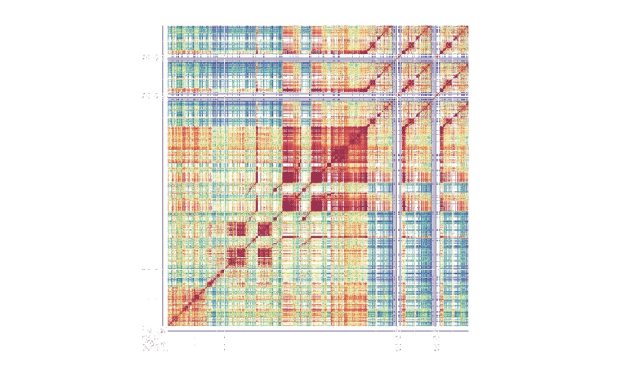Caian Prof KJ Patel – CRUK Chief Scientist
- 06 January 2023
- 5 minutes
Professor KJ Patel (Molecular Biology PhD 1989) believes seismic progress is possible during his five-year term as Cancer Research UK’s Chief Scientist.
KJ’s time at Caius began as a postgraduate student, continued as a Research Fellow and then a Fellow in an association which lasted over 25 years.
He began his role as CRUK’s Chief Scientist in October 2022 and is optimistic of advancing treatment and preventative measures, in no small part due to work from colleagues including Shankar Balasubramanian and David Klenerman of the University of Cambridge, who discovered a revolutionary DNA sequencing technology which is transforming medicine and life sciences more generally.
“The tools for understanding the biology of cancer are so powerful now, because we’re in the midst of a number of transformative technologies,” KJ says.
“We are able to sequence the code of life at scale and at speed and at low cost. To solve the shapes of the proteins took anywhere from five to 20 years to do only five years ago. It can now be done in 20 minutes on a computer.
“We have the ability to see the molecules of life very quickly, through the use of the microscope and the ability for new computation, Artificial Intelligence, to look at the code of life, look at what it’s coding for and see the molecules of life, the proteins, in three dimensions.
“If you bring all this together looking at a singular biological problem like cancer, that is a phenomenal kapow.”
KJ has two main questions fundamental to understanding cancer.
He says: “We know we have cells that have all the genetic instructions which make them cancerous, yet they sit there in a completely dormant state and behave completely normally. But something comes along and triggers them to become cancerous. We do not understand that trigger. I think that’s a very important question. We are probably all covered with cancer initiating cells. But only one in five of us has a cancer that takes root. How does that happen?
“My second question: what is the purpose of cancer in living organisms? Is it inherent to the fabric life? Almost certainly it is, but we don’t understand what it is in the fabric of life which drives the origin of most cancers.
“There are paradoxes. Certain very large animals like whales and elephants have very low risk of cancer. This is known as Peto’s paradox. We don’t know why that’s the case. Why should certain animals be protected from a disease which is pretty much otherwise universal in most larger living forms?
“The disruptive technologies reduce the timescale in which big ambitious questions will be addressed. I certainly think the first paradox will be answered in the next few years.
“The more philosophical question on the origins and purposes of cancer – could it be an evolutionary necessity? – is much more open ended.”
Detection of cancer is also likely to improve in the near future, KJ says.
He adds: “I certainly think we’ll see much better detection of cancers. We know that cancer cells shed DNA into the blood. If we’re able to sample blood and identify the DNA coming from a cancer cell we might be able to use this technique to devise a simple blood test to screen populations for cancers. I think that will happen in the next five years.”
KJ’s role is to provide oversight on the existing portfolio of CRUK research and advise on scientific direction to responsibly use the £400million a year the charity receives through fundraising.
CRUK is the world’s biggest charitable funder of cancer research. It’s a position which carries significant responsibility. Every life in the UK is affected by this disease.
“CRUK is the world’s biggest charitable funder of cancer research,” he adds.
“It’s a position which carries significant responsibility. Every life in the UK is affected by this disease.
“I remember when I was in Cambridge I’d go to the Saturday market where a woman had baked cakes to be sold for fundraising, because her daughter died of cancer. Although that money contributed to that £400m a year the dedication here had a great influence on me.
“When we think it looks really hopeless we have to recognise that 50 years ago childhood leukaemia was universally fatal and now it’s largely a curative disease. It takes time and understanding for the science to alter the course of this illness.
“But there’s a bigger mystery in why it happens at all. And that’s why I’m excited about Cancer Research picking me to do this post.”
KJ’s time at Caius proved influential as part of a Fellowship which included luminaries such as Professor Stephen Hawking, Professor Sir Sam Edwards and Professor Sir Alan Fersht. During his PhD as a mature student he was fined for not seeing his Tutor, a sanction which would not be meted out today. When a Fellow his undergraduate students included Dr Zoe Fritz (Medicine 1995), now a Fellow herself.
“It’s been central to my career and my life. I’ve wonderful memories of each stage of my life at Caius, with these brilliant and towering scientific figures around” he adds.
“It was a very inspirational place for a young Research Fellow to be. The Research Fellowship gave me a freedom to be able to do what I like. In that period as a postdoctoral worker I did some work that explained what is the basis of genetic susceptibility to breast cancer. That started me on the journey which led to me being elected to the Royal Society.
“I always enjoyed the dynamism of Caius. The eclectic nature of the Fellowship and the environment. It was a place of ferment and debate.
“My research is about the toxicity of alcohol, but at Caius I was much better known as being a good wine taster than a capable scientist!”


